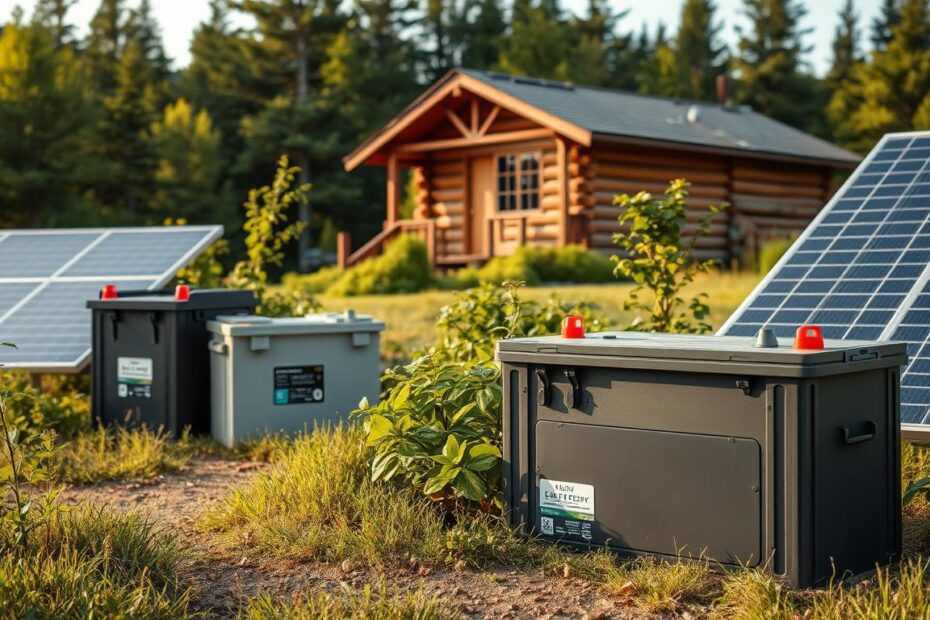When you leave the power grid behind, choosing the right energy storage is key. The batteries you pick will power your home and all your devices. This guide will show you the top three battery choices for off-grid living. They’ll make sure you have power whenever you need it.
Key Takeaways
- Lithium-ion batteries offer unparalleled longevity, with a lifespan of 3,000 to 5,000 cycles.
- Lead-acid batteries are a reliable and well-established option, though they may not match the energy density of lithium-ion.
- Saltwater batteries are an emerging technology that provides a more environmentally-friendly alternative to traditional battery types.
- Proper battery care and maintenance can significantly extend the lifespan of your off-grid energy storage system.
- Choosing the right battery for your specific energy needs and budget is crucial for the success of your off-grid lifestyle.
Understanding Off-Grid Energy Systems
Off-grid energy systems are becoming more popular for homes and businesses. They work on their own, using solar power systems or wind power. This means they don’t rely on the main electrical grid.
What is an Off-Grid Energy System?
An off-grid system is a power solution that stands alone. It uses solar panels and batteries to store energy. This way, it can power homes, businesses, or remote areas without the grid.
Benefits of Going Off-Grid
- Energy Independence: Off-grid systems let you control your energy. This makes you self-sufficient and less dependent on the grid.
- Reduced Environmental Impact: They use renewable energy storage. This makes them better for the planet and helps create a sustainable future.
- Cost Savings: Although they cost more upfront, off-grid systems save money on bills. This is especially true in places with high electricity costs.
Choosing the right battery is key for off-grid systems. Different types, like lithium-ion, lead-acid, and saltwater batteries, have their own advantages and challenges.
Types of Batteries for Off-Grid Systems
Choosing the right battery for your off-grid system is key. It affects how well your system works, how long it lasts, and its overall efficiency. Lithium-ion batteries, lead-acid batteries, and saltwater batteries each have their own benefits and drawbacks for off-grid use.
Lithium-Ion Batteries
Lithium-ion batteries are a top pick for many off-grid systems. They pack a lot of energy and last a long time. These batteries are great for off-grid solar setups, with an efficiency of up to 95%. For example, the Jackery Explorer 3000 Pro Power Station offers 3024Wh capacity and 3000W power output. They’re perfect for off-grid living, camping, RVs, and homes.
Lead-Acid Batteries
Lead-acid batteries have been a favorite for off-grid solar systems because they’re affordable. They come in different types like flooded lead-acid (FLA), absorbed glass mat (AGM), and gel batteries. While they don’t last as long as lithium-ion, they’re still a reliable and budget-friendly option. The Jackery Explorer 2000 Plus Power Station is a good example.
Saltwater Batteries
Saltwater batteries are a newer, greener choice for off-grid energy storage. They use saltwater instead of harmful chemicals found in other batteries. They might not be as energy-dense as lithium-ion or as cheap as lead-acid, but they’re a good choice for those who care about the environment.
When picking a battery for your off-grid system, think about capacity, discharge rates, lifespan, and temperature tolerance. These factors help ensure the battery meets your energy needs and works well in your environment.
The Three Best Batteries for Off-Grid Energy
Choosing the right battery is key for your off-grid energy system. Three top picks are Lithium Iron Phosphate (LiFePO4), Absorbent Glass Mat (AGM) batteries, and Gel batteries. Each has its own strengths for storing power off-grid.
Lithium Iron Phosphate (LiFePO4)
Lithium Iron Phosphate (LiFePO4) batteries are known for their battery performance and safety. They last a long time, up to 15 years, and are very efficient, up to 95%. This makes them a top choice for off-grid power storage.
Absorbent Glass Mat (AGM) Batteries
Absorbent Glass Mat (AGM) batteries are a good, affordable option for off-grid power storage. They last 5 to 12 years and work well in tough conditions. This makes them a solid choice for renewable energy batteries.
Gel Batteries
Gel batteries are easy to maintain and work well in extreme temperatures. They are spill-proof and can be installed in any way. While not as long-lasting as others, they are still a reliable choice for off-grid energy systems.
Each battery type has its own benefits. The right choice depends on your system size, budget, and location. By considering these factors, you can pick the best battery for your off-grid energy system.
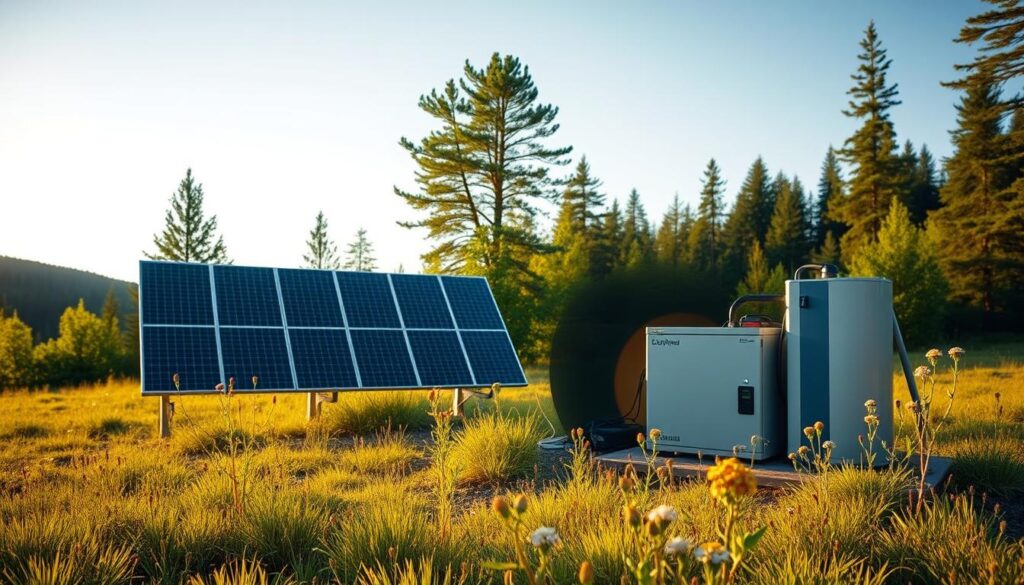
Factors to Consider When Choosing a Battery
Choosing the right battery for your off-grid system is key. You need to think about capacity and discharge rates, lifespan, and how well it handles temperature. These factors ensure your system works well over time.
Capacity and Discharge Rates
Battery capacity shows how much energy it can store, in watt-hours (Wh) or amp-hours (Ah). More capacity means more power for your needs. Discharge rates tell you how fast you can use that power. Faster rates are better for heavy energy use.
Lifespan and Cycle Life
The battery’s lifespan is important for saving money. Lead-acid batteries last 3-5 years, while lithium-ion can last up to 10 years. Cycle life, or how many times you can charge and discharge it, is also key. Some batteries can handle over 4,000 cycles before losing power.
Temperature Tolerance
Your battery must handle extreme temperatures well. Lithium-ion batteries do great in both hot and cold. But lead-acid batteries might not do as well in extreme weather. You might need extra steps to keep them working right.
By looking at these factors, you can pick the best battery for your system. This ensures your energy storage efficiency and battery selection criteria are top-notch.
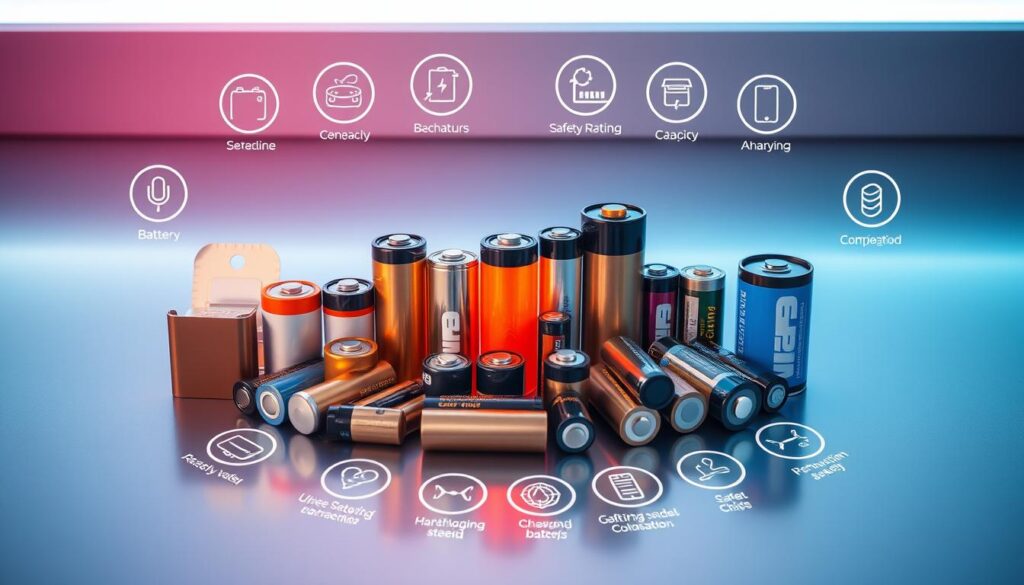
Prolonging the Life of Lithium-Ion Batteries
Keeping your lithium-ion batteries in good shape is key. This is true for your off-grid system, laptop, or phone. By following a few easy steps, you can make sure your batteries last longer and work well for years.
Avoid Complete Discharges
One important tip is to not let your batteries run all the way down. Try to keep them charged between 20% and 80%. This helps them last longer. Letting them go to 100% can cut down on their life.
Temperature Management
Temperature is also very important for your batteries. They work best between 50°F and 95°F (10°C to 35°C). If it gets too hot, your batteries can wear out faster.
Use Quality Chargers
Choosing the right charger is also crucial. Don’t use cheap chargers. They might not charge your batteries right. A good charger helps prevent damage and keeps your batteries healthy.
By following these tips, you can make your lithium-ion batteries last longer. This means you’ll have reliable power for your devices for many years.

Caring for Laptop Batteries
Keeping your laptop battery healthy is key for uninterrupted work and avoiding expensive fixes. Simple habits can make your battery last longer and work better for years.
Maintain Optimal Charging Habits
Don’t keep your laptop plugged in all the time when it’s fully charged. Try to charge it when it’s between 20-30% and stop at 80-90%. This stops overcharging and keeps your battery in top shape.
Avoid Overheating
Too much heat is bad for your laptop battery. Make sure your device has good airflow. Don’t leave it in direct sunlight or hot places. Using a cooling pad or stand can help keep it cool.
Keep Software Updated
Keeping your laptop’s software and drivers up to date is important. It helps manage power better and can make your battery last longer. Check for updates to your operating system and power tools to keep your laptop battery life at its best.
By following these tips, you can keep your mobile device’s battery healthy. Enjoying long-lasting battery performance from your laptop is possible. Taking care of your battery health means your device will work well for years.
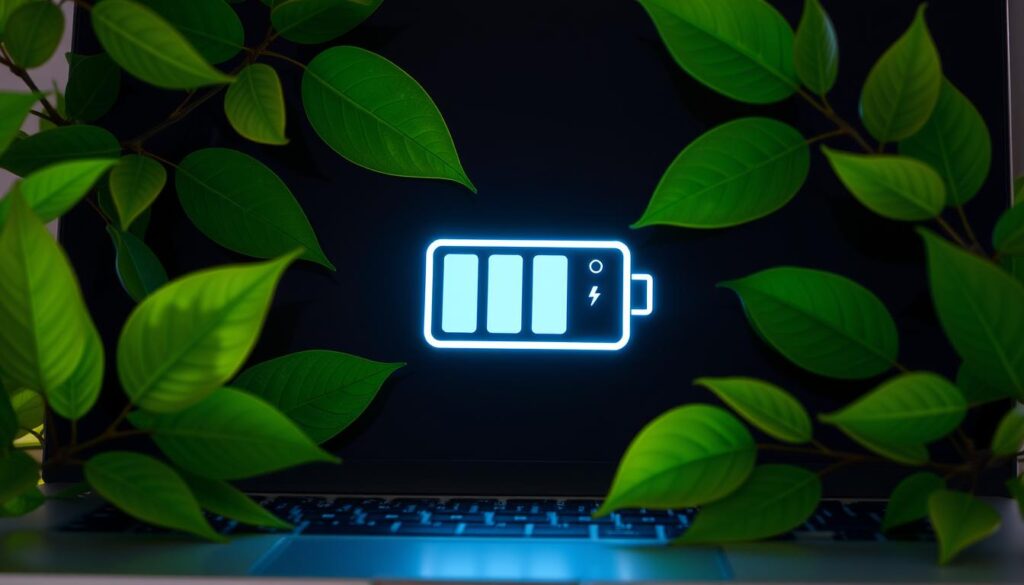
Best Practices for Cell Phone Battery Life
Keeping your smartphone’s battery healthy is key for mobile device efficiency. By following simple smartphone battery care tips, you can make your battery last longer. Here are the best ways to keep your cell phone battery in top shape.
Frequency of Charging
Charging your phone often is better for its battery health. Don’t let it run out completely before charging. Try to keep your battery between 20% and 80% charged. This balanced charging approach helps your battery last longer.
Disable Unnecessary Features
- Turn off location services, Bluetooth, and Wi-Fi when not in use. These features can drain your battery if left on.
- Lower your screen brightness to save power. Bright screens use more energy, so dimming helps.
- Close apps you’re not using. Background apps can still use battery.
Use Power-Saving Modes
Most phones have power-saving modes to extend battery life. Turn these modes on when your battery is low or when you need to save energy. These modes often reduce screen brightness and limit app activity.
By following these smartphone battery care tips, you can make your phone’s battery last longer. This ensures your device is always ready for your busy lifestyle.

Monitoring Your Battery Health
Keeping your off-grid energy system’s batteries healthy is key for their long-term performance. Battery Management Systems (BMS) are crucial in this effort. They offer real-time monitoring and optimization of your battery’s performance.
Importance of Battery Management Systems (BMS)
A BMS is a complex electronic system that tracks your batteries’ voltage, current, and temperature. It prevents overcharging, over-discharging, and keeps cell balance. This can greatly extend your batteries’ lifespan. A BMS alerts you to any issues, so you can fix them early.
Regular Inspections and Maintenance
- Regularly check your battery connections and terminals for cleanliness and corrosion.
- Look at your lead-acid batteries’ electrolyte levels and refill them when needed.
- Watch your battery’s voltage and temperature for any problems.
- Do a thorough maintenance routine, including cleaning, tightening connections, and checking for wear.
Using a battery health monitoring system and sticking to a maintenance schedule boosts your off-grid energy system‘s efficiency and lifespan. By keeping an eye on your battery’s BMS technology, your system will keep performing well for many years.
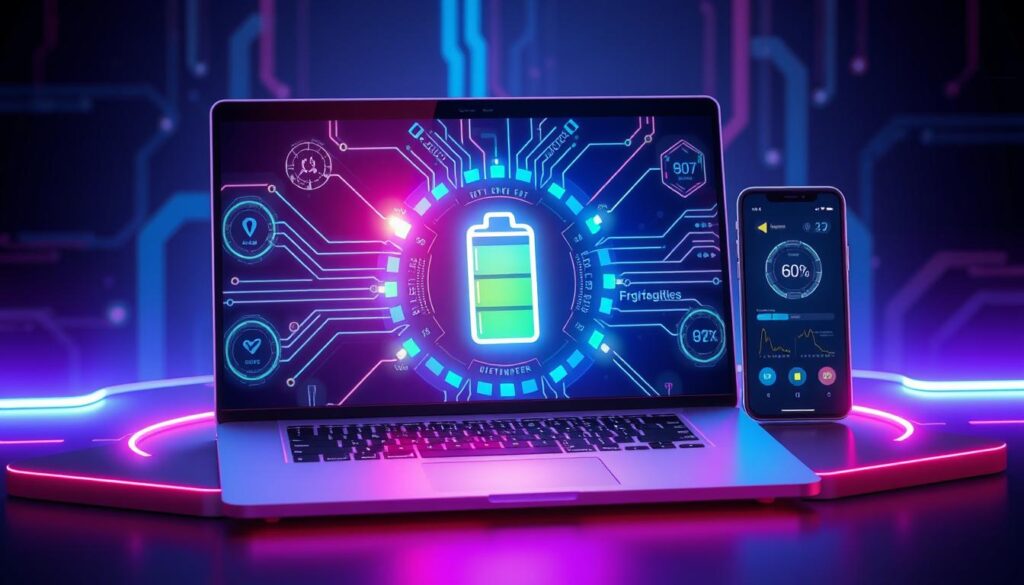
Environmental Considerations for Off-Grid Batteries
When you look into off-grid energy systems, think about the environment. Choosing the right batteries is key for a sustainable setup. There are many options that help reduce your carbon footprint and support a greener future.
Recycling Options
Proper disposal and recycling of off-grid batteries are vital. Many parts, like metals and plastics, can be recycled. This reduces waste and saves resources. By picking a good recycling program, you ensure your batteries are recycled responsibly.
Choosing Sustainable Materials
Look for batteries made from sustainable materials. Lithium-ion batteries, especially those with lithium iron phosphate (LiFePO4), are eco-friendly. They have less environmental impact and no toxic materials. These sustainable energy storage options help reduce your carbon footprint while supporting battery recycling and eco-friendly batteries.

“Choosing batteries that are made with sustainable materials and can be easily recycled is a critical step in creating an off-grid system that is truly eco-friendly and long-lasting.”
By focusing on environmental factors in your battery choice, you help the planet. You make your off-grid system reliable and responsible. With the right choices, you can live off-grid sustainably and with less environmental impact.
Cost Considerations for Buying Batteries
When you’re setting up an off-grid energy system, the cost of batteries is key. The upfront cost might seem steep, but looking at both short-term and long-term savings is smart. Battery cost analysis and understanding energy storage economics are crucial for a good off-grid system investment.
Initial Investment vs. Long-Term Savings
Top-notch batteries like lithium-ion or lithium iron phosphate (LiFePO4) cost more at first. But they last longer and work better, saving you money in the long run. On the other hand, lead-acid batteries might be cheaper upfront. But they don’t last as long and aren’t as efficient, leading to more costs over time.
Incentives and Rebates
To lower the cost of batteries for off-grid systems, look for incentives and rebates. Governments and utility companies often give financial help for renewable energy storage. Checking out these options can cut down the cost of your off-grid energy system.
When looking at battery costs, think about warranty, lifespan, and upkeep. This detailed look will help you find the best deal for your off-grid energy needs. It balances the initial cost with long-term savings and green benefits.
Conclusion: Making the Right Choice for Your Off-Grid System
Choosing the right batteries for your off-grid system is crucial. You need to know about different battery types and their performance. This helps you pick a system that fits your needs.
Consider your energy needs, the environment, and your budget. Whether you choose lithium-ion, lead-acid, or flow batteries, make sure they match your requirements. This ensures your system works well.
Keeping your batteries in good shape is key. Follow best practices like avoiding deep discharges and keeping them cool. Use quality chargers to extend their life.
Regularly check your battery’s health and adjust as needed. This keeps your system running smoothly.
The best choice for your system depends on cost, performance, and environmental impact. Think carefully about each option. This way, you make a choice that supports your long-term energy needs and is good for the planet.
FAQ
What are the key factors to consider when choosing batteries for an off-grid energy system?
Important factors include capacity, discharge rates, and lifespan. Also, consider temperature tolerance. Finding the right balance is key for a good off-grid system.
What are the benefits of going off-grid with a renewable energy system?
Going off-grid means you’re independent of the grid. It’s better for the environment and can save money over time.
What are the different types of batteries suitable for off-grid energy systems?
Suitable batteries include lithium-ion, lead-acid, and saltwater batteries. Each has its own benefits and characteristics.
What are the three best battery types for off-grid energy systems?
The top three are lithium iron phosphate (LiFePO4), absorbent glass mat (AGM) batteries, and gel batteries. They offer great cycle life, cost-effectiveness, and handle temperature well.
How can I prolong the life of my lithium-ion batteries used in an off-grid system?
To make lithium-ion batteries last longer, avoid full discharges. Keep them charged between 20% and 80%. Use them in temperatures between 50°F to 95°F (10°C to 35°C). Choose high-quality chargers and avoid fast charging.
How can I properly care for laptop and cell phone batteries to maximize their lifespan?
For laptops, don’t keep them at 100% charge all the time. Use partial charging cycles and ensure good ventilation. For cell phones, charge often but avoid overcharging. Turn off power-hungry features and use power-saving modes.
Why is a Battery Management System (BMS) important for off-grid energy systems?
A BMS is vital for monitoring and improving battery performance. It prevents overcharging and over-discharging. It also keeps cell balance, which boosts efficiency and longevity.
What environmental considerations should I keep in mind when selecting and disposing of off-grid batteries?
Choose batteries made from sustainable materials. Ensure they are recycled properly to reduce environmental harm and support sustainability.
How do I evaluate the long-term costs and savings when selecting batteries for an off-grid system?
Look at both the initial cost and long-term savings. Quality batteries may cost more upfront but last longer and perform better. Check for incentives and rebates to lower the initial cost.
Source Links
- The Best Batteries for Solar Off-Grid [2023] – Jackery
- Top Off Grid Solar Batteries 2023: Ultimate Guide – MANLY
- What Are the Best Battery Types for Off-Grid Living?
- The Best Batteries for Solar Off-Grid [2023] – Jackery
- The Best Batteries for Solar Off-Grid [2023] – Jackery
- Top Off Grid Solar Batteries 2023: Ultimate Guide – MANLY
- The Best Batteries for Off-Grid Solar Power Systems
- Top Off Grid Solar Batteries 2023: Ultimate Guide – MANLY
- The Best Home Battery for a Net Zero Home? – Undecided with Matt Ferrell
- How to Choose from 5 Types of Solar Batteries | WHC SOLAR
- The Best Solar Batteries for Off-Grid Living: Factors, Cost, Products, and More
- What is the Best Battery for an Off-grid Solar System?
- Battery Life Explained – How to Prolong the Life of Lithium Batteries — Clean Energy Reviews
- BU-808: How to Prolong Lithium-based Batteries
- Tips for extending the lifetime of lithium-ion batteries
- The Ultimate Guide To The 10 Best Off-Grid Battery
- The Best Batteries for Solar Off-Grid [2023] – Jackery
- 3 Best Batteries for Solar Off-Grid in 2024: Reviews & Recommendations for You
- Lithium vs. Lead-Acid Batteries for Off-Grid Systems
- Your Guide to the Best Batteries for Solar Off-Grid: Pros and Cons
- Top Off Grid Solar Batteries 2023: Ultimate Guide – MANLY
- How to choose the best solar battery for your needs
- The Best Batteries for Solar Off-Grid [2023] – Jackery
- Top Off Grid Solar Batteries 2023: Ultimate Guide – MANLY
- 3 Best Batteries for Solar Off-Grid in 2024: Reviews & Recommendations for You
- The Best Batteries for Solar Off-Grid [2023] – Jackery
- Lithium vs. Lead-Acid Batteries for Off-Grid Systems
- Top Off Grid Solar Batteries 2023: Ultimate Guide – MANLY
- The Best Off Grid Solar System for Your Needs
